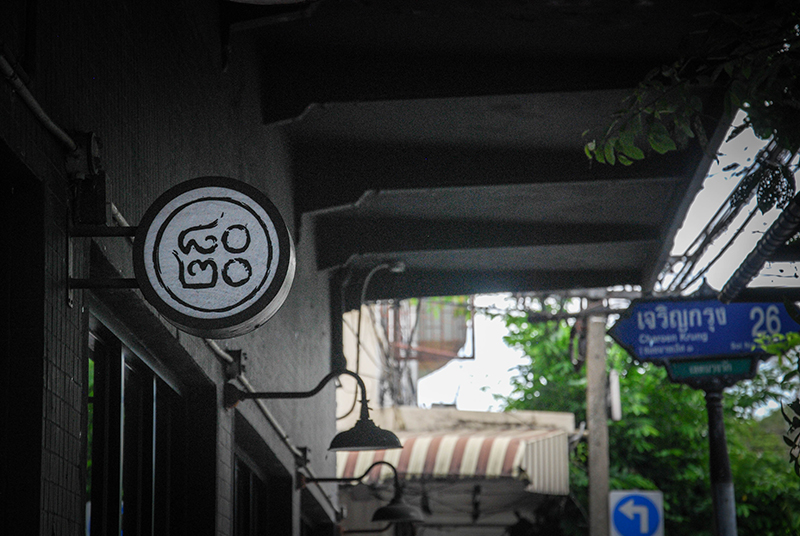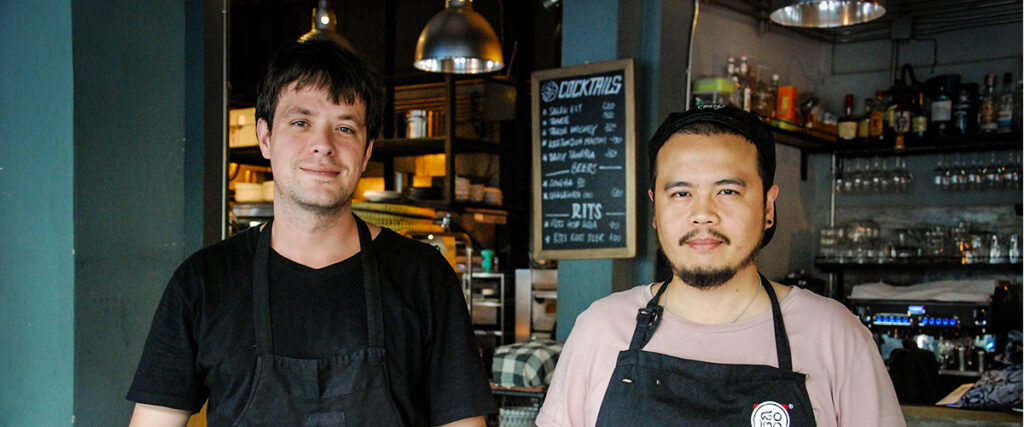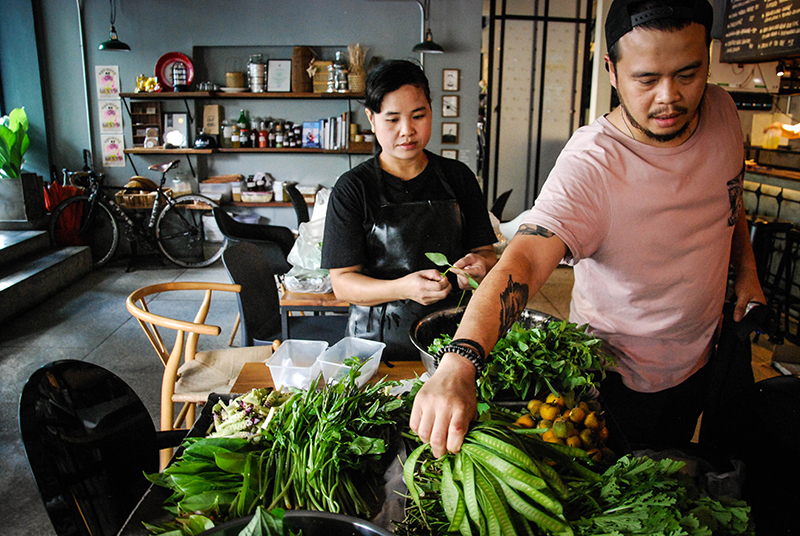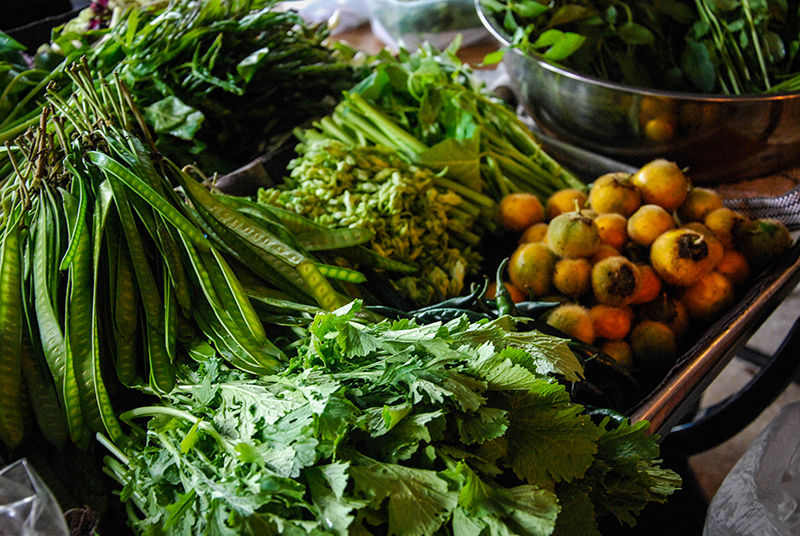In the hip Charoenkrung district of Bangkok, a small restaurant is forging the way for a new food scene in the city. Welcome to the inspiring world of Andrew Martin, Chef at 80/20.
They may have been born on opposite sides of the world – Andrew is from Canada and moved to Thailand, whilst Napol studied in Canada before moving back to his home country – but Andrew Martin and Napol Jantraget more than come together in their shared vision of a new concept in dining to be found at their restaurant 80/20. Established in Bangkok in 2015, their small eatery packs a big punch, serving honest food made with local ingredients and infused with Asian and Western influences – and it is slowly changing the perceptions of everyone who visits it.
Focused on solely using ingredients sourced either by foraging far and wide in the Thai countryside or from early morning trips to local markets, the two young chefs’ vision has put a fresh spin on their local food scene, inspiring their diners and reinvigorating an interest in Thailand’s incredible indigenous produce as they go. Here, Andrew tells us how he got to be one of a new wave of chefs showing a new way to feed people food that nourishes the body and soul.
How long have you been cooking? How did you get into this cooking lifestyle?
Oh wow, for a long time! I started when I was just 15 at home and then, when I graduated high school, I took a year off to work at a burger joint. I was just washing dishes and working at the deep-fry station, but soon I started to get into the role and the adrenaline of it amazed me; I just like the excitement of the kitchen.
I then went on to intern at a fine dining restaurant where I literally peeled garlic and tomatoes, which I thought was lame! But, the dishes they served were amazing and presented beautifully. Eventually, I worked my way around several restaurants in Canada, spending a few years in each place. I also did a short course at culinary school, just to get my foot into the door. But really, I was eager to work and learn on the job.
While other restaurants sourcing their ingredients from supermarkets or from middlemen who do the legwork for them, what inspired you to place this emphasis on foraging?
For me, cooking is all about feeling emotions, telling stories, and using the ideas I get from the places I visit. I am very connected with how I was raised. My dad’s family are Canadian farmers and my mother’s family are Japanese fishermen. When I was five years old, we would go out fishing, or into the woods to collect mushrooms and whatever herbs we could find before bringing it all back for my Grandma to cook. It was all about doing something fun and seeing what was out there. And that’s where I gained my appreciation for having adventures that revolve around food.
I am also very connected with my travels. When I went to Isan (a Northeastern region in Thailand), I found so many new plants I had never tasted, I saw herbs I’d never seen growing in gardens, and fruits I’d never come across. So I thought, “why not put them altogether on a plate?” Essentially, cooking and creating new dishes are my ways of telling stories about my adventures to people. I go to the market everyday, I go out to the woods – for me it’s really exciting and there’s always a big story behind my food.
At 80/20, you guys use local and forgotten ingredients you find from foraging the forests in Thailand. What made you adopt this approach when you can buy fresh produce from wholesalers?
I love Thailand. I love the country, the people, and the culture. This is my home and I just want to cook with fresh Thai ingredients that can only be found here – no dairy or anything imported. As I have mentioned before, my food conveys my adventures and travels, so sometimes it’s not even about the ingredients but about the trips I make to collect them. Cooking with them reconnects me with those memories and emotions.
You guys don’t play by the rules.
Absolutely not. I like to play with local produce because it’s so exciting to me. But with Napol, he looks for ways to make food different from the food he grew up with. He has ingredients like coconut vinegar, soy sauce made from Thai beer, mulberry vinegar – he does things in a different style but still keeps it completely Thai. We don’t follow cookbooks because it sets boundaries that limit us – sometimes you just need to go as far as your thoughts can carry you. You don’t want to be trapped in a cage, and failed dishes are simply part of the fun.

The relationship between the farmer, the cook, and their customers is becoming a lost notion. What do you think about this?
Food brings people together and it should not be just something you eat to survive. I cook with fresh and local Thai ingredients that I went out and bought from farmers myself. It is very important to know where your food comes from and how it is made. This road to bringing back the sense of value to be found in the food we eat has a long way to go, but we are taking small steps at a time. I think that more and more people in the cooking industry are reapplying this notion of a true relationship between the farmer and the cook, and as a community I think that we are doing very well. We are also really keen on the idea of reconnecting the chef and the guest, so by creating this open kitchen we get to interact with each other. It keeps the food a little more soulful.
Do you often create dishes that fail?
Of course! Many actually. Sometimes things just turn out so fantastic that I don’t even think about changing them, but sometimes the results are just terrible. As a chef, I work with new ingredients and create new dishes all the time, so I have to accept that sometimes the idea sounds good but doesn’t always work out. At the end of the day, it’s all about trying and having fun.
As a chef, what are the struggles you face daily?
We have bad days sometimes, and in a restaurant, bad days are BAD! Things can just keep going wrong – the food doesn’t come out right, the guests all come in at once, booked guests don’t show up. The whole day can be a struggle, but then a good day is just so incredible that everyone in the restaurant is happy and smiling. One thing I realized a long time ago is that, sometimes, it’s not about our happiness, but the guest’s happiness. We want to make them feel warm and welcome – this is the most important thing. When you can make other people happy, then that’s the real winning ticket.
Also, when someone doesn’t like my food, it hurts, of course. But a while ago, I accepted that everyone has their own preferences and I can’t beat myself up too much. So, of course we have bad days and we can get tense, but for the most part we are pretty laid back here at 80/20.
How do you see yourself in the future?
I know where I want to go and what I want to do and so does everyone here, but for now I am just appreciating working with Napol. He led me in to be a part of his family in Thailand and if it were not for him, I would not be here. So at the moment, I do not have a definite future plan because I am just enjoying the moment.
Address :
80/20 Restaurant Bangkok
1054, 1052 Charoen Krung Rd, Bang Rak, Bangkok 10500
www.facebook.com/8020bkk/
Related Articles
A Foodie’s Guide to the Best Street Food in Bangkok
Preserving Bangkok’s Street Food Scene
Vanishing Bangkok: Photographer Ben Davies Documents Bangkok’s Cultural Heritage







